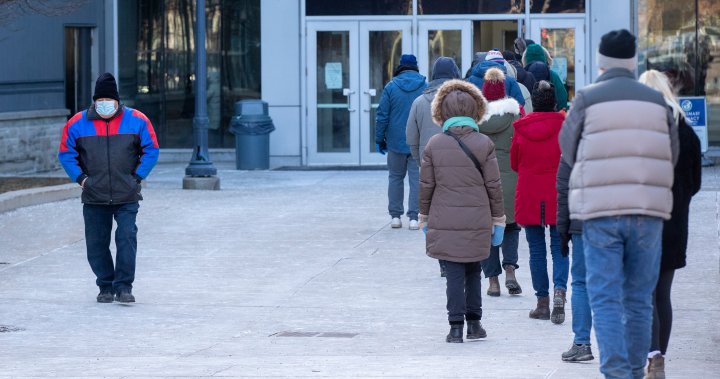Canada in for ‘intense’ weeks of Omicron infections, hospitalization surges: data – National | Globalnews.ca
Canada is set for several “intense” weeks of COVID-19 activity as Omicron will continue to drive record infections and hospitalizations, new federal data suggests.
The projections, made by Canadian health officials on Friday, indicate the Omicron wave could peak at 170,000 cases a day this month, though officials say the numbers are estimates of the “true number of daily cases” that may be occurring due to testing restrictions limiting reported cases.
Meanwhile, officials project that new hospital admissions could peak at 2,000 a day later this month.
“While Canada could see a sharp peak and decline in cases in the coming weeks, given disease activity far exceeding previous peaks, even the downside of this curve will be considerable,” said Dr. Theresa Tam, Canada’s chief public health officer.
“With several weeks of very intense activity expected to come, we need to do our best now to limit the size and impact of the Omicron surge in order to maintain the health system and critical functions of society.”
Across Canada, more than 37,500 new infections are being reported daily, though that number is likely an underestimate due to testing restrictions, Tam said.
On hospitalizations, Tam said while evidence shows the risk for hospital admission from Omicron is lower than Delta, the sheer volume of infections is driving an increase in severe illness trends nationally.
While infections are increasing among all age groups, 20-to-39-year-olds have experienced the most infections in recent weeks, Tam said.
Furthermore, unvaccinated people are 19 times more likely to be hospitalized with COVID-19 compared to fully vaccinated people.
Tam said next week will be “quite important” to see if Canada will hit its Omicron peak.
“It’s quite possible in the next days that we’ll see that peak at least in the cases,” she said, adding hospitalizations could continue to increase sharply, and then decline quickly.
“We’re all just need to be cautious about pronouncing on that until we’ve seen more information.”
As of Jan. 10, 6,926 hospital beds in the country were occupied by COVID-19 patients – up from 4,113 on Jan. 3, the government reports.
Across Canada, new infections and related hospitalizations remain at or near record levels.
In the meantime, some governments are easing pandemic restrictions while others are tightening them depending on their perceptions of whether the curve is flattening or has yet to peak.
On Monday, Quebec is lifting its controversial 10 p.m. to 5 a.m. curfew because researchers there believe the latest wave of the pandemic is peaking.
Also, Nunavut said its tough measures implemented just before Christmas have been so effective that it’s cancelling travel restrictions on Monday, allowing businesses to reopen and schools will resume in-person learning on Jan. 24.
Read more:
Severe illness not rising as fast as ‘enormous’ number of Omicron infections, Tam says
However, in New Brunswick new restrictions are now in effect, limiting residents to a single-household bubble. Gyms, entertainment venues and indoor dining at restaurants have been closed.
In nearby Prince Edward Island, chief medical health officer Dr. Heather Morrison says the “worst of this wave” is yet to come. Current restrictions that include business capacity limits and remote learning for school students will be extended.
While Canada moves through the Omicron wave, vaccination against the disease continues.
As of Jan. 1, 87 per cent of Canadians 12 years of age and older are fully vaccinated against COVID-19. Out of the total population, that represents 77 per cent, data shows.
Tam continued to urge Canadians to get vaccinated against COVID-19, and get their boosters once eligible.
“We need to continue efforts to increase vaccine coverage to enhance protection for everyone we can,” she said.
At its last modelling update in December 2021, government officials projected a COVID-19 resurgence in Canada driven by Omicron.
It said at the time if infections continue to rise as they were and if Omicron took hold, the variant could outpace Delta and drive infections up to 26,600 a day by mid-January.
Omicron’s impact on Canadian society has been vast, as several governments have had to reimpose restrictions and limit testing capacity to deal with the onslaught of cases and hospitalizations.
— with files from The Canadian Press
View link »
© 2022 Global News, a division of Corus Entertainment Inc.
For all the latest health News Click Here




